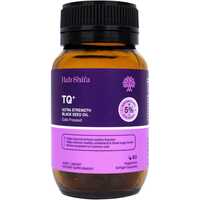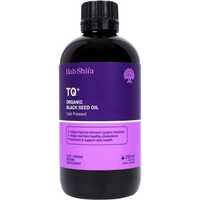Derived from the seeds of the plant Nigella sativa, black seed oil has a storied history of use in traditional medicine spanning thousands of years. Known for its remarkable therapeutic benefits, this ancient remedy is celebrated in holistic health circles and is even referenced in the Old Testament of the Bible. The timeless appeal of black seed oil benefits, coupled with emerging scientific research, emphasizes its role in supporting a healthier lifestyle through potential diabetes management, cancer prevention, and its antihistamine, anti-inflammatory, and antioxidant properties.
With a growing body of evidence highlighting the extensive black seed oil benefits, this article aims to explore its nutritional profile and key components alongside its multifaceted health advantages. From supporting liver and kidney function to improving skin conditions, aiding in weight loss, and exhibiting potential anti-cancer properties, black seed oil emerges as a key player in the quest for natural health solutions. This narrative not only underlines its importance in today's wellness landscape but also hints at how the integration of Nigella sativa into daily routines can unlock its myriad of benefits for the immune system, offer pain relief, and enhance overall well-being.
What is Black Seed Oil?
Black seed oil, derived from the seeds of the flowering Nigella sativa plant, has been a staple in traditional medicine for over 2,000 years. The plant itself is native to a broad region encompassing southern and eastern Europe, the Middle East, North Africa, and southwest Asia. This oil is not only used for its therapeutic properties but also incorporated into daily health routines in various forms:
- Consumption Forms: Most commonly, people consume black seed oil in capsule form to manage a range of health conditions. The typical dosage ranges from 1-2.5 grams taken orally each day.
- Applications: It is used both orally and topically to address numerous health issues. These applications include but are not limited to treating asthma, bronchitis, pain relief, inflammation, and skin conditions like eczema.
The oil is rich in several key components that contribute to its health benefits:
- Thymoquinone: This is the most notable compound in black seed oil, recognized for its potent antioxidant and anti-inflammatory effects. Thymoquinone also exhibits properties such as being hepatoprotective, analgesic, antibacterial, antiviral, antifungal, cytotoxic, and offering potential anti-cancer benefits.
- Nutritional Content: Black seed oil is a good source of healthy fatty acids like linoleic acid and oleic acid, which are beneficial for heart health. It also contains B vitamins, vitamin E, and essential minerals such as calcium, iron, magnesium, potassium, and zinc.
- Traditional Uses: Historically, the oil has been used in various traditional systems of medicine to treat diseases like fever, dizziness, paralysis, chronic headaches, and more. It is also combined with honey to relieve asthmatic symptoms, bronchospasms, and chest congestion.
Black seed oil's versatility and the breadth of its benefits make it a valuable addition to health and wellness regimens, supporting everything from liver and kidney function to skin health and immune system fortification.
Nutritional Profile and Key Components
Black seed oil, derived from the Nigella sativa plant, is celebrated not only for its therapeutic properties but also for its impressive nutritional profile. Here’s a closer look at the key components and nutrients that contribute to its health benefits:
Thymoquinone:
This potent compound is the star of black seed oil's chemical makeup. It exhibits a wide range of pharmacological properties including antioxidant, anti-inflammatory, and potentially tumor-reducing effects. Thymoquinone also supports liver and kidney health, adding to the oil's versatility.
Nutritional Content:
A tablespoon of black seed oil provides a substantial amount of nutrients:Additionally, black seed oil is a good source of essential minerals and vitamins including calcium, iron, zinc, copper, thiamin, niacin, phosphorous, folic acid, vitamin B6, and vitamin B2.
- Calories: 54
- Total Fat: 4.9 grams (Saturated fat: 0.4 grams, Monounsaturated fat: 1.9 grams, Polyunsaturated fat: 2.5 grams)
- Carbohydrates: 1.1 grams (Dietary fiber: 0.7 grams, Sugars: 0.2 grams)
- Protein: 0.4 grams
- Thymoquinone: 21 mg
Fatty Acid Profile:
The oil contains a healthy mix of fats which are crucial for various body functions:These fatty acids are known for their benefits to heart health and overall cellular function.
- Omega 3 (linolenic acid)
- Omega 6 (linoleic acid)
- Omega 7 (palmitoleic acid, and arachidonic acid)
In addition to these primary components, black seed oil also offers a range of amino acids, including 8 of the 9 essential amino acids, further underscoring its nutritional value. The combination of these nutrients makes black seed oil a compelling supplement for enhancing overall health.
Health Benefits of Black Seed Oil
Exploring the diverse health benefits of black seed oil reveals its potential in managing and improving various health conditions. Here's a detailed look at some of the significant health benefits supported by scientific studies:
Cardiovascular Health and Metabolic Syndrome
Regular intake of black seed oil has shown promising results in reducing high blood pressure and cholesterol levels, crucial factors in cardiovascular health and metabolic syndrome. A study involving 55 individuals with hypertension observed a significant decrease in diastolic blood pressure, total cholesterol, LDL cholesterol, and fasting blood sugar after taking 2.5 mL of black seed oil twice daily for 8 weeks.
- Additionally, black seed oil supplementation was found to lower total cholesterol, triglycerides, LDL cholesterol, and body mass index while increasing HDL cholesterol and VO2 max, further supporting its benefits in improving heart health and metabolic conditions.
Weight Management and Digestive Health:
- The weight management properties of black seed oil are attributed to its ability to suppress appetite and reduce caloric intake. It is not associated with toxic effects; instead, it benefits metabolic health by lowering elevated liver enzymes and improving lipid profiles and insulin resistance.
- Black seed oil aids in digestive health by alleviating symptoms such as indigestion, nausea, abdominal distention, bloating, vomiting, diarrhea, or constipation, making it a versatile supplement for gastrointestinal well-being.
Skin and Hair Care:
- The oil's anti-inflammatory and antioxidant properties contribute to its effectiveness in treating skin conditions like eczema, acne, and psoriasis. It also promotes wound healing and may help manage skin pigmentation issues such as vitiligo.
- For hair care, black seed oil has been noted to enhance the strength, texture, shine, and volume of hair. It also treats scalp conditions, providing moisture and aiding in the healing of scalp wounds.
Each of these benefits highlights black seed oil's role as a natural supplement for enhancing overall health and addressing specific health issues effectively.
Supports Liver and Kidney Function
Black seed oil, renowned for its therapeutic properties, also plays a significant role in supporting liver and kidney function. Here are some of the ways it contributes to the health of these vital organs:
Liver Protection:
- Black seed oil contains antioxidants that are crucial in safeguarding the liver from damage caused by toxins and chemicals. This protective effect is primarily attributed to thymoquinone, a compound found in black seed oil, which helps to mitigate the harmful impacts of environmental and dietary toxins.
- Clinical studies suggest that black seed oil can effectively reduce liver enzymes and bilirubin levels, which are indicators of liver health, thereby improving liver function in individuals exposed to harmful substances.
Kidney Health:
- The antioxidant properties of black seed oil help reduce oxidative stress in the kidneys, which is essential for maintaining kidney health and function. Oxidative stress can lead to various kidney diseases and complications, but the antioxidative effects of black seed oil work to prevent these conditions.
- Research has shown that black seed oil can aid in reducing the size of kidney stones and facilitate their elimination from the body, providing a natural solution for those suffering from this painful condition.
- In more severe cases, such as chronic kidney disease (CKD), black seed oil has demonstrated potential benefits. Clinical trials indicate that it can normalize blood and urine parameters and improve disease outcomes, offering a complementary treatment option for advanced CKD patients.
- Black seed oil's anti-inflammatory properties also contribute to its effectiveness in protecting against various kidney injuries caused by stress factors, enhancing kidney resilience and recovery.
These benefits underscore the potential of black seed oil as a natural adjunct therapy for improving liver and kidney function, making it a valuable component of a holistic approach to organ health.
Improves Skin Conditions
Black seed oil is highly regarded for its skin-enhancing properties, supported by a variety of studies that highlight its effectiveness in treating common skin conditions. Here are some key benefits:
Acne Reduction:
- Black seed oil's antimicrobial and anti-inflammatory properties make it an effective treatment for acne. Studies have shown a significant reduction in acne severity, with one study reporting a 78% decrease over 60 days.
- A topical hydrogel containing black seed oil applied directly to the skin has also shown significant improvements in acne symptoms without adverse reactions.
Psoriasis and Eczema Management:
- The anti-inflammatory qualities of black seed oil contribute to its effectiveness in managing psoriasis and eczema. It helps reduce inflammation and other symptoms associated with these conditions.
- For psoriasis, both the oil and its extracts have been used in treatments that show promising results in chronic cases. Animal studies also suggest a reduction in inflammation which is pivotal in treating psoriasis.
Wound Healing and Pigmentation Improvement:
- Thymoquinone, a key component in black seed oil, is known to stimulate tissue growth, which can accelerate the healing process of wounds including burns, excisions, and diabetic wounds.
- A study highlighted that applying a cream made with black seed oil to the skin twice daily improved skin pigmentation in areas like the hands, face, and genital region after 6 months.
These findings underscore the potential of black seed oil as a natural remedy for various dermatological issues, enhancing skin health without the harsh side effects often associated with chemical treatments.
Supports Weight Loss
Black seed oil has been recognized for its potential benefits in weight management, particularly for women with obesity. Here are some key findings from recent studies:
Appetite Suppression and Weight Reduction:
A significant study involving 45 women with overweight or obesity conditions revealed that consuming 2,000 mg of black seed oil daily for 8 weeks led to notable health improvements. Participants experienced a decrease in appetite, which contributed to a reduction in body mass index (BMI), body weight, waist circumference, and overall body fat.
Targeted Fat Loss:
Research indicates that black seed oil may particularly affect fat reduction around the midsection, a common area of concern for many individuals aiming for weight loss. This targeted fat loss is crucial as abdominal fat is strongly linked with higher health risks.
Additional Benefits and Uses:
Beyond direct weight loss, black seed oil contains thymoquinone, which not only supports weight management but also improves skin conditions and aids in wound healing.
The versatility of black seed oil extends to its use in culinary practices; it can be incorporated into cooking, baking, and beverages, providing a practical way to integrate this beneficial oil into daily diets.
These points underscore the multifaceted benefits of black seed oil, not only in supporting weight loss but also in enhancing overall health through its various applications.
Potential Anti-Cancer Properties
Exploring the potential anti-cancer properties of black seed oil, particularly its main bioactive component thymoquinone (TQ), reveals promising findings in the field of oncology. Here's how TQ contributes to cancer prevention and treatment:
Interference with Cancer Processes:
- TQ has been shown to disrupt a variety of tumorigenic processes including carcinogenesis, malignant growth, and the spread of cancer cells through invasion and migration.
- It also inhibits angiogenesis, the process by which new blood vessels form from pre-existing vessels, which is crucial for tumor growth.
Enhancement of Conventional Cancer Treatments:
- TQ can enhance the efficacy of traditional cancer treatments like radiotherapy, chemotherapy, and immunotherapy.
- It is particularly noteworthy for its ability to sensitize tumor cells to these treatments while simultaneously reducing the toxic effects these therapies can have on normal cells.
Promotion of Cell Death in Cancer Cells:
- Research indicates that thymoquinone can induce programmed cell death in various cancer cell types, providing a mechanism for its anti-cancer effects.
- In animal models, the essential oil of black seed oil significantly inhibited the development of solid tumors and reduced the incidence of liver metastasis, thereby improving survival rates.
These findings underscore the potential of black seed oil, and specifically thymoquinone, as a supportive adjuvant therapy in cancer treatment, offering a natural complement to conventional methods.
Conclusion
Throughout this article, we have ventured into the multifaceted world of black seed oil, revealing its considerable potential in enhancing health and well-being. From its acclaimed nutritional profile rich in essential fatty acids, vitamins, and the powerful compound thymoquinone, to its vast health benefits ranging from supporting cardiovascular health, aiding in weight management, improving liver and kidney function, to mitigating various skin conditions and even showing promise in cancer treatment, black seed oil stands out as a remarkable, natural health ally. Its historical use in traditional medicine now finds backing through scientific research, highlighting its significance in a modern wellness landscape.
As we conclude, it's evident that integrating black seed oil into one's daily regimen could unlock a plethora of health advantages, emphasizing its role as a key player in nurturing a healthier lifestyle. However, as with any supplement, it's vital to approach its use with mindfulness, taking into account personal health conditions and consulting with a healthcare provider to ensure its benefits are fully realized without adverse effects. The exploration of black seed oil embodies the convergence of ancient wisdom and contemporary science, promising a pathway to holistic health that merits further research and widespread recognition.
FAQs
1. What are the health benefits of black seed oil?
Black seed oil is known for its potential to alleviate various skin conditions such as eczema, psoriasis, acne, and vitiligo, as well as skin cancer and infections. It can also be incorporated into daily skincare routines to cleanse, moisturize, and soothe skin irritations.
2. How long does it typically take to experience the effects of black seed oil?
For specific benefits like weight loss and blood sugar reduction, studies have found that taking higher doses of 2–3 grams daily for a duration of 8–12 weeks tends to be most effective.
3. Can black seed oil help prevent aging?
Yes, black seed oil is beneficial in combating the signs of aging. It is rich in Vitamin A and retinoids, which are known to effectively reduce fine lines and wrinkles by stimulating collagen and elastin production in the skin.
4. Are there any medications that should not be taken with black seed oil?
Yes, black seed oil should be used cautiously with certain medications. It can intensify the effects of anticoagulants (blood thinners), potentially leading to excessive blood thinning. Additionally, it can lower blood pressure, which may interact with blood pressure medications.


 Certified Organic
Certified Organic Vegan Friendly
Vegan Friendly  Vegetarian
Vegetarian Organic Ingredients
Organic Ingredients Dairy Free
Dairy Free Gluten Free
Gluten Free Keto Friendly
Keto Friendly


































